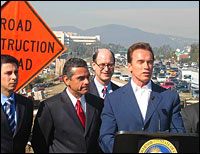The State of California just passed a budget that, thanks to Governor Schwarzenegger and the Republicans in the Assembly, removes $1.3 billion from the public transit budget. Yes, this is the same state and governor that passed a cap-and-trade bill that seeks to cut carbon emissions by 20 percent by 2020. But so far, the only thing being cut is the one way to get cars off of the roads.

You know all of those ways we could allegedly do the equivalent of removing cars from the road, like buying compact fluorescent light bulbs? Trains and buses actually replace cars. In addition, more public transit leads to absolute and certain reduction in emissions. Even mandating greater efficiency of cars does not eliminate the possibility of greater emissions. More efficient cars might simply delay an increase in carbon emissions, since miles traveled keeps going upward — unless there are trains or buses.
With peak oil looming, the situation is getting more critical, both for drivers who have to pay more for their gas, and might therefore prefer to take public transit if it was available, and for nonelectrified buses and trains, since their fuel costs increase. So, the logical thing to do would be to increase public transit funding. Enter the convoluted state of budgets in most states, particularly California:
Drivers buy gasoline. They pay a special gas tax, and that money has to go roads and other transportation projects. Except in fiscal emergencies, when it could be diverted to the general fund. Fiscal emergencies, it turned out, happened all the time. So voters — here’s that pattern — got fed up and passed an initiative to cut off that diversion.
Ah, but drivers also pay sales taxes on gasoline, and unlike the sales tax on anything else, the tax on fuel has to be used only for roads and other transportation projects. Except in fiscal emergencies, when … Well, you get the idea.
When gasoline prices soar, a chunk of the gasoline sales tax goes to fund public transit. But that “spillover” never actually spills over. The governor and the Legislature take it to balance the budget. That’s what happened this year, as in most years. Drivers pay, but they don’t get what they’re paying for.
Got it? Good, because I don’t, and it gets worse. According to the Transportation and Land Use Coalition (TALC):
Spillover dollars provide critically important funding to local transit operators. In a time when working families have suffered persistent fare hikes and service cuts, these flexible dollars are needed to keep our transit systems running
California voters just passed a proposition that funds transportation (including roads) to the tune of $20 billion over 30 years. So, Schwarzenegger decided that since public transit was getting the money they needed anyway, he might as well take the new money and plug other holes in the state budget, even though they weren’t supposed to do that … except in fiscal emergencies. Meanwhile, that $20 billion is for building new things, not maintaining existing things — the money for which is supposed to come from the spillover. Fortunately, Schwarzenegger’s attempt to permanently eliminate this spillover fund was defeated.
TALC claims that typically “Less than 20% of state transportation funding typically goes to public transit.” According to the California Transportation Commission, the state actually needs $200 billion in improvements to its transportation infrastructure. Here are just some of the projects imperiled in southern California:
The cuts could imperil a variety of transit projects, most notably the Exposition Line light rail from downtown L.A. to the Westside, extending the Orange Line busway from Warner Center to Chatsworth, and building the Gold Line from Pasadena to San Bernardino County, said Roger Snoble, chief executive of the Metropolitan Transportation Authority.
“As far as improving transportation here, it’s really a big setback,” Snoble said.
Having grown up in southern California, I find the idea that California could significantly reduce its carbon emissions simply by improving gas mileage to be quite a stretch; if southern California does not engage in a large-scale program of public transit, there is no way that they will hit their emissions targets. The San Francisco Bay Area is in much better shape since they at least have BART, and it is a denser area. But much of the state has been built on the assumption that the big interstates would carry much of the traffic.
Apparently it was relatively easy for Schwarzenegger to look green by mandating tighter standards in the future, but when the going got tough, he acted more like the bad Terminator, as far as public transit is concerned.


